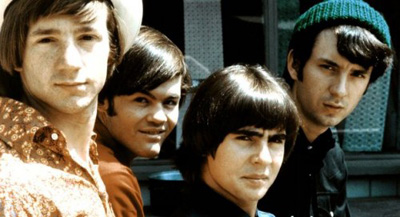Chapter Two: Head
By Brett Ballard-Beach
May 24, 2012
Armed with such limited presuppositions, what is evident to even a layman viewing Head is the tremendous surge of bitterness and anger. I watched it twice on consecutive nights, and it was a little harder to work myself up the second time around only because I knew there would be little to no levity to offset the caustic emotional nihilism that begins the film and then builds to a crescendo once again by the end. (I counted precisely one laugh-out loud moment, and that was solely attributable to Mike Nesmith’s verbal timing.) I don’t take this paucity of laughs to be a failure on the film’s part. The same sort of gags that peppered the show are here (though in far lesser numbers), but more often than not, they are staged for funhouse mirror-type distortion and anxiety, rather than laughter or hijinks.
Consider, for example, the excerpts at the top of the column for comparison of the television show’s theme song lyrics versus the rejiggered anti-theme lyrics, which appear early on in Head under the title “Ditty Diego War Chant.” The easygoing goodtime bouncy flow of the former is supplanted by the manic, almost sped up sung/spoken nature of the latter. The replacement of that sunny optimism (as well as the promise that the “young generation [has] something to say”) with such an acerbic cynicism serves as an introduction/thesis for what is about to follow.
However, Head isn’t simply a narrow indictment of the mobs of pubescent girls who shrieked over them (the fans generally aren’t raked over the coals) or merely a shallow but occasionally potent acknowledgement of the Vietnam War (then-new images appear abruptly from time to time, particularly during several channel-surfing montages). What Nicholson, Nesmith, Davy Jones, Peter Tork, Micky Dolenz, and director/co-writer Bob Rafelson have perpetrated is an indictment of celebrity itself triumphing over artistic pretensions. The more you struggle against the image you have created - or that has been erected on your behalf - the worse it gets. Like flailing in quicksand that only sucks you in deeper, every effort by the band individually or as a unit to rail against the artificiality of their circumstances fails miserably. They are caught in a waking nightmare of Bunuelian proportions.
The film opens (sans credits or studio logos of any kind) with a bridge dedication ceremony populated entirely by representatives of the world from which the Monkees remain outcasts: elected officials, police, the press, and the military. For nearly two minutes the camera tracks or holds with no cuts, creating a claustrophobic pseudo-documentary style effect before the band appears from off-screen, breaks through the ceremonial tape (fleeing someone or something) and Dolenz takes the deep dive off the span, finding some kind of brief respite in the water with mythical sea creatures while the psychedelic opening number “Porpoise Song” plays on the soundtrack.
Head returns to that image at the film, in an ironic fashion, but this opening sequence initiates the film’s modus operandi: segments slip into one another like the layers of a Chinese box and the four band members find themselves passing on through an endless gamut of Hollywood back lot clichés and generic conventions, shuttling from Western to dancehall musical and from Indian through trench warfare. This strategy of disconnection often intentionally isolates the band members from one another, even if they all happen to be sharing the same shot. A telling example is the segment that immediately follows from the “Porpoise Song” opening.
Continued:
1
2
3
|
|
|
|




